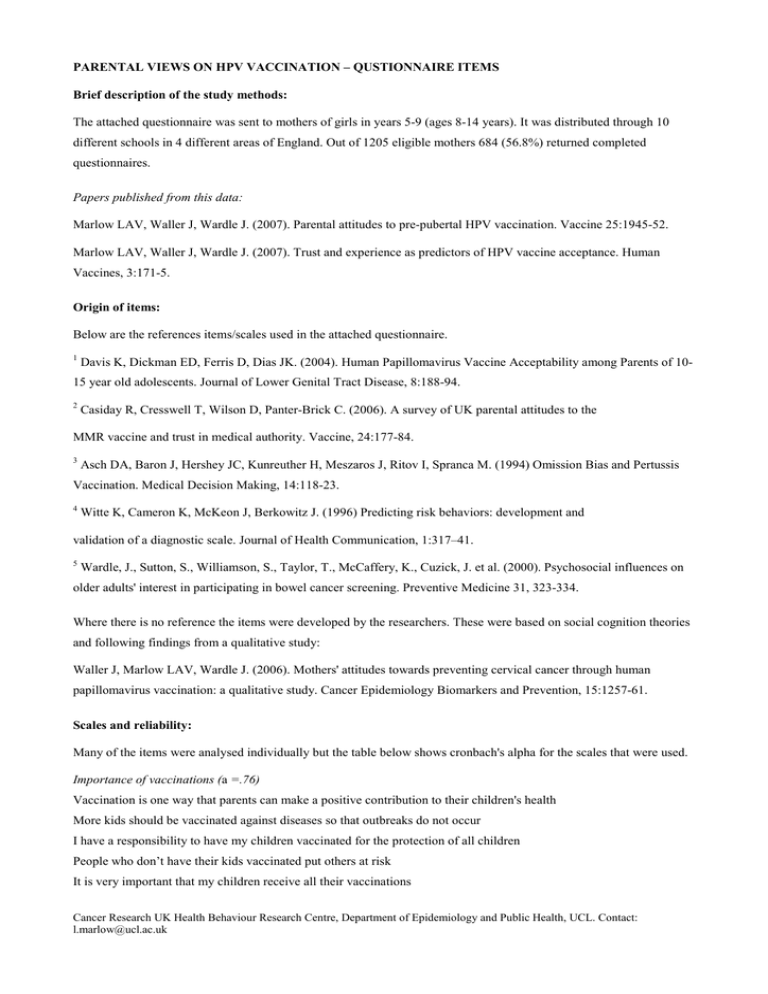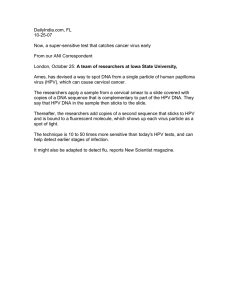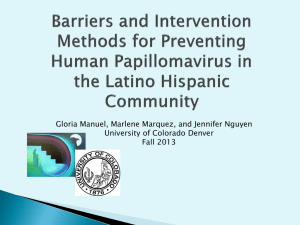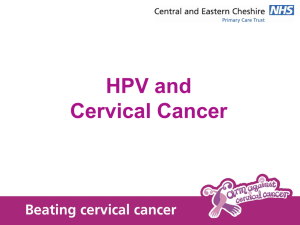PARENTAL VIEWS ON HPV VACCINATION – QUSTIONNAIRE ITEMS
advertisement

PARENTAL VIEWS ON HPV VACCINATION – QUSTIONNAIRE ITEMS Brief description of the study methods: The attached questionnaire was sent to mothers of girls in years 5-9 (ages 8-14 years). It was distributed through 10 different schools in 4 different areas of England. Out of 1205 eligible mothers 684 (56.8%) returned completed questionnaires. Papers published from this data: Marlow LAV, Waller J, Wardle J. (2007). Parental attitudes to pre-pubertal HPV vaccination. Vaccine 25:1945-52. Marlow LAV, Waller J, Wardle J. (2007). Trust and experience as predictors of HPV vaccine acceptance. Human Vaccines, 3:171-5. Origin of items: Below are the references items/scales used in the attached questionnaire. 1 Davis K, Dickman ED, Ferris D, Dias JK. (2004). Human Papillomavirus Vaccine Acceptability among Parents of 10- 15 year old adolescents. Journal of Lower Genital Tract Disease, 8:188-94. 2 Casiday R, Cresswell T, Wilson D, Panter-Brick C. (2006). A survey of UK parental attitudes to the MMR vaccine and trust in medical authority. Vaccine, 24:177-84. 3 Asch DA, Baron J, Hershey JC, Kunreuther H, Meszaros J, Ritov I, Spranca M. (1994) Omission Bias and Pertussis Vaccination. Medical Decision Making, 14:118-23. 4 Witte K, Cameron K, McKeon J, Berkowitz J. (1996) Predicting risk behaviors: development and validation of a diagnostic scale. Journal of Health Communication, 1:317–41. 5 Wardle, J., Sutton, S., Williamson, S., Taylor, T., McCaffery, K., Cuzick, J. et al. (2000). Psychosocial influences on older adults' interest in participating in bowel cancer screening. Preventive Medicine 31, 323-334. Where there is no reference the items were developed by the researchers. These were based on social cognition theories and following findings from a qualitative study: Waller J, Marlow LAV, Wardle J. (2006). Mothers' attitudes towards preventing cervical cancer through human papillomavirus vaccination: a qualitative study. Cancer Epidemiology Biomarkers and Prevention, 15:1257-61. Scales and reliability: Many of the items were analysed individually but the table below shows cronbach's alpha for the scales that were used. Importance of vaccinations (a =.76) Vaccination is one way that parents can make a positive contribution to their children's health More kids should be vaccinated against diseases so that outbreaks do not occur I have a responsibility to have my children vaccinated for the protection of all children People who don’t have their kids vaccinated put others at risk It is very important that my children receive all their vaccinations Cancer Research UK Health Behaviour Research Centre, Department of Epidemiology and Public Health, UCL. Contact: l.marlow@ucl.ac.uk General trust in doctors and government (a = .66) Doctors are too dismissive of what parents claim about vaccination* The government is too defensive about MMR* The government would stop vaccinations if there was evidence of a serious risk The government does a good job of protecting us from risks to health Susceptibility of HPV (a = .80) It is likely that my daughter will get HPV one day My daughter may one day be at risk of getting HPV It is possible that my daughter may get HPV in the future Severity of HPV (a = .83) I believe that HPV can be extremely harmful I believe that HPV can be serious I believe that HPV can have serious negative consequences Susceptibility of cervical cancer (a = .59) It is likely that my daughter(s) will get cervical cancer one day My daughter(s) may one day be at risk of getting cervical cancer It is possible that my daughter(s) will get cervical cancer in the future Severity of cervical cancer (a = .74) I believe that cervical cancer can be extremely harmful I believe that cervical cancer is serious I believe that cervical cancer has serious negative consequences HPV knowledge measure (a = .60) HPV often has no visible signs or symptoms Having many sexual partners increases the risk of getting HPV HPV always causes genital warts HPV is related to the AIDS virus HPV can be transmitted during sexual intercourse HPV can be treated with antibiotics HPV is very rare HPV can cause cervical cancer HPV usually goes away without needing any treatment Most sexually active people will get HPV at some point in their lives A person always knows if they have HPV A person could have HPV for many years without knowing it Men cannot get HPV The HPV knowledge measure was developed by the researchers and the final measure includes 13 items (see above). Two items were removed (A smear test will always pick up an HPV infection in the cervix; HPV usually has no effect on men). Cancer Research UK Health Behaviour Research Centre, Department of Epidemiology and Public Health, UCL. Contact: l.marlow@ucl.ac.uk




